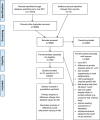Effects of higher- versus lower-protein diets on health outcomes: a systematic review and meta-analysis
- PMID: 22510792
- PMCID: PMC3392894
- DOI: 10.1038/ejcn.2012.37
Effects of higher- versus lower-protein diets on health outcomes: a systematic review and meta-analysis
Abstract
Background/objectives: Numerous randomised controlled trials (RCTs) published in first tier medical journals have evaluated the health effects of diets high in protein. We conducted a rigorous systematic review of RCTs comparing higher- and lower-protein diets.
Methods: We searched several electronic databases up to July 2011 for studies focusing on patient-important outcomes (for example, cardiovascular disease) and secondary outcomes such as risk factors for chronic disease (for example, adiposity).
Results: We identified 111 articles reporting on 74 trials. Pooled effect sizes using standardised mean differences (SMDs) were small to moderate and favoured higher-protein diets for weight loss (SMD -0.36, 95% confidence interval (CI) -0.56 to -0.17), body mass index (-0.37, CI -0.56 to 0.19), waist circumference (-0.43, CI -0.69 to -0.16), blood pressure (systolic: -0.21, CI -0.32 to -0.09 and diastolic: -0.18, CI -0.29 to -0.06), high-density lipoproteins (HDL 0.25, CI 0.07 to 0.44), fasting insulin (-0.20, CI -0.39 to -0.01) and triglycerides (-0.51, CI -0.78 to -0.24). Sensitivity analysis of studies with lower risk of bias abolished the effect on HDL and fasting insulin, and reduced the effect on triglycerides. We observed nonsignificant effects on total cholesterol, low-density lipoproteins, C-reactive protein, HbA1c, fasting blood glucose, and surrogates for bone and kidney health. Adverse gastrointestinal events were more common with high-protein diets. Multivariable meta-regression analysis showed no significant dose response with higher protein intake.
Conclusions: Higher-protein diets probably improve adiposity, blood pressure and triglyceride levels, but these effects are small and need to be weighed against the potential for harms.
Figures




Comment in
-
Higher-protein diets for health?Eur J Clin Nutr. 2012 Jul;66(7):763-4. doi: 10.1038/ejcn.2012.46. Eur J Clin Nutr. 2012. PMID: 22760096 No abstract available.
-
Higher- versus lower-protein diets.Eur J Clin Nutr. 2012 Dec;66(12):1372-3; author reply 1375. doi: 10.1038/ejcn.2012.154. Epub 2012 Oct 24. Eur J Clin Nutr. 2012. PMID: 23093342 No abstract available.
-
Response to low-carbohydrate diets and cardiovascular risk factors by Santos et al.Obes Rev. 2013 Feb;14(2):184-6. doi: 10.1111/j.1467-789X.2012.01044.x. Obes Rev. 2013. PMID: 23294906 No abstract available.
References
-
- United States Department of Agriculture ChooseMyPlate.gov. . http://www.choosemyplate.gov ( accessed 9 April 2012).
-
- Health Canada Canada's Food Guide. . http://www.hc-sc.gc.ca/fn-an/food-guide-aliment/index-eng.php ( accessed 9 April 2012).
-
- UK Department of Health in association with the Welsh Government, the Scottish Government and the Food Standards Agency in Northern Ireland Eatwellplate. . http://www.nhs.uk/Livewell/Goodfood/Pages/eatwell-plate.aspx ( accessed 9 April 2012).
-
- Astrup A, Meinert Larsen T, Harper A. Atkins and other low-carbohydrate diets: hoax or an effective tool for weight loss. Lancet. 2004;364:897–899. - PubMed
-
- Yancy WS, Olsen MK, Guyton JR, Bakst RP, Westman EC, Yancy William S, et al. A low-carbohydrate, ketogenic diet versus a low-fat diet to treat obesity and hyperlipidemia: a randomised, controlled trial. Ann Intern Med. 2004;140:769–777. - PubMed
Publication types
MeSH terms
Substances
LinkOut - more resources
Full Text Sources
Medical
Molecular Biology Databases
Research Materials

